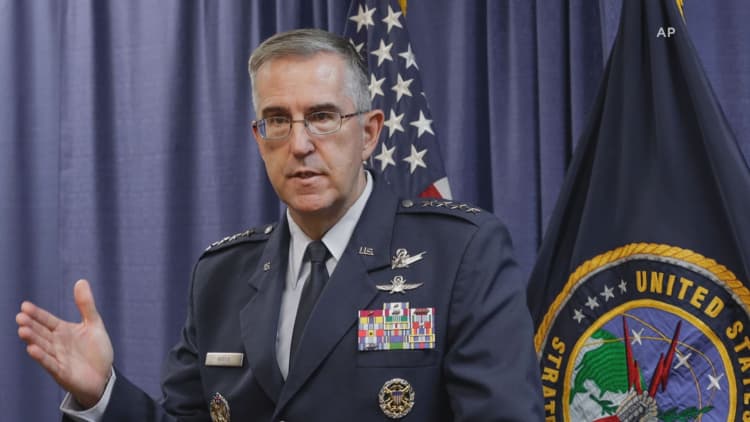
The Air Force general in charge of America's nuclear arsenal provided a rare glimpse into what he would do if Russia launched two nuclear-tipped ballistic missiles at the United States.
His take might be surprising to some.
Gen. John Hyten told lawmakers this week that the U.S. should not retaliate until incoming missiles had reached their targets or were destroyed in-flight by defense systems.
"If we do have to respond, we want to respond in kind and not further escalate the conflict out of control," Hyten, the commander of U.S. Strategic Command, told the Senate Armed Services Committee on Tuesday.
He added that the window for detecting the missiles is "a very short period of time."
"From detection to the creation of the explosion is less than 30 minutes," the four-star general said.
Hyten noted that if the missiles did not pose an existential threat, then the U.S. would not then have to respond with an existential threat. "That's what I would recommend if I saw that coming against the United States," he said.
While Hyten recommended a measured response in such a scenario, he urged lawmakers to consider the Pentagon's request to add new nuclear weapons to its arsenal.
"I strongly agree with the need for a low-yield nuclear weapon," Hyten said in regard to submarine-launched warheads. "That capability is a deterrence weapon to respond to the threat that Russia, in particular, is portraying."
Lawmakers questioned Hyten on whether adding more nuclear warheads would escalate tensions. The commander then quoted former Secretary of State and National Security Advisor Henry Kissinger and said that without the right response options, the U.S. president would be choosing between "suicide or surrender."
"Suicide if you escalate too high and the escalation comes back at you. Surrender if you don't have the ability to respond," Hyten explained. "And so, an adversary — Russia in this case — will see a weapon coming ... but they don't have to respond right now, and they won't have time to respond because they won't want to commit suicide."
He continued by saying that the primary mission of nuclear warheads is deterrence and not to start a nuclear war.
"The first use of that weapon is to make sure that nobody uses that kind of weapon against us," Hyten said. "I'd prefer Iran without nuclear weapons. I'd prefer North Korea without nuclear weapons. But I don't think nuclear weapons will ever go away."
Hyten, who has previously called Russia the "most significant threat" to the U.S., also told lawmakers that there is currently no defense against the hypersonic weapons Putin is pursuing.
"We don't have any defense that could deny the employment of such a weapon against us." This means that, as of now, the U.S. has to rely on deterrence against these so-called hypersonic weapons, he said.


